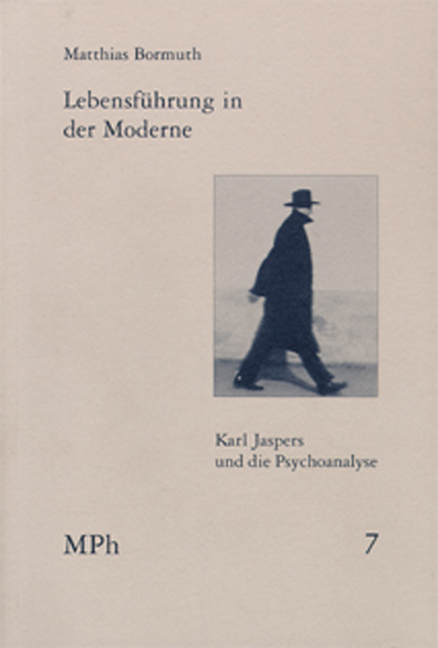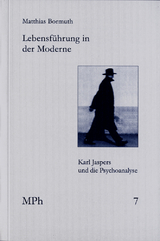
Lebensführung in der Moderne
Karl Jaspers und die Psychoanalyse
Seiten
2016
|
unveränderter Nachdruck der 1. Auflage (2002)
Frommann-Holzboog (Verlag)
978-3-7728-2201-8 (ISBN)
Frommann-Holzboog (Verlag)
978-3-7728-2201-8 (ISBN)
- Titel erscheint in neuer Auflage
- Artikel merken
Zu diesem Artikel existiert eine Nachauflage
Karl Jaspers‹ criticism on psychoanalysis forms the central point of the prize-winning treatise honoured by the University of Zürich. It conveys his arguments against Freud‹s thinking with regard to the history of ideas both within the context of Psychiatry around 1900 and the cultural criticism based on existential philosophy around 1930. From a sociological aspect, their interpretation draws upon Max Weber‹s theory of modern times. By means of sources so far unpublished, the author looks into the matter of how Jaspers reacted on the decline and the revival of psychoanalysis before and after 1945. Especially the fierce controversy with Alexander Mitscherlich which continued well into the 1960s is an important part of the history of psychoanalysis and, from the point of view of contemporary history, belongs to the intellectual foundation of the Federal Republic of Germany. Not to neglect and of special interest to medical ethics is the implicit discourse on the limits of the physician‹s authority. This discourse also refers to the leading question of the possibilities of an individual lifestyle in modern times. Die Psychoanalysekritik von Karl Jaspers (1883–1969) steht im Mittelpunkt dieser von den Universitäten Zürich und Tübingen preisgekrönten Studie. Jaspers’ Argumente wider Freuds Denken werden sowohl in medizintheoretischer als auch in existenzphilosophischer Hinsicht untersucht, wobei Max Webers Theorie der Moderne als Leitfaden der Interpretation dient. Bislang unveröffentlichte Quellen legen frei, wie Karl Jaspers auf Untergang und Wiederaufstieg der Psychoanalyse vor und nach 1945 reagierte. Dabei erweist sich seine scharfe Kontroverse mit Alexander Mitscherlich und Viktor von Weizsäcker als entscheidend für die Geschichte der Psychoanalyse in der Bundesrepublik. Medizinethisch aufschlussreich ist die in diesem Rahmen geführte Diskussion über die Grenzen ärztlicher Autorität in der Psychotherapie. Auch sie verweist auf die leitende Frage der Untersuchung nach einer individuell zu verantwortenden Lebensführung in der Moderne.
Karl Jaspers’ criticism on psychoanalysis forms the central point of the prize-winning treatise honoured by the University of Zürich. It conveys his arguments against Freud’s thinking with regard to the history of ideas both within the context of Psychiatry around 1900 and the cultural criticism based on existential philosophy around 1930. From a sociological aspect, their interpretation draws upon Max Weber’s theory of modern times. By means of sources so far unpublished, the author looks into the matter of how Jaspers reacted on the decline and the revival of psychoanalysis before and after 1945. Especially the fierce controversy with Alexander Mitscherlich which continued well into the 1960s is an important part of the history of psychoanalysis and, from the point of view of contemporary history, belongs to the intellectual foundation of the Federal Republic of Germany. Not to neglect and of special interest to medical ethics is the implicit discourse on the limits of the physician’s authority. This discourse also refers to the leading question of the possibilities of an individual lifestyle in modern times.
Karl Jaspers’ criticism on psychoanalysis forms the central point of the prize-winning treatise honoured by the University of Zürich. It conveys his arguments against Freud’s thinking with regard to the history of ideas both within the context of Psychiatry around 1900 and the cultural criticism based on existential philosophy around 1930. From a sociological aspect, their interpretation draws upon Max Weber’s theory of modern times. By means of sources so far unpublished, the author looks into the matter of how Jaspers reacted on the decline and the revival of psychoanalysis before and after 1945. Especially the fierce controversy with Alexander Mitscherlich which continued well into the 1960s is an important part of the history of psychoanalysis and, from the point of view of contemporary history, belongs to the intellectual foundation of the Federal Republic of Germany. Not to neglect and of special interest to medical ethics is the implicit discourse on the limits of the physician’s authority. This discourse also refers to the leading question of the possibilities of an individual lifestyle in modern times.
Matthias Bormuth, geb. 1963, nach Medizinstudium und psychiatrischer Tätigkeit Promotion über Karl Jaspers und die Psychoanalyse. Seit 1998 Mitarbeiter am Tübinger Institut für Ethik und Geschichte in der Medizin mit geistesgeschichtlichen Arbeiten zu Psychiatrie, Philosophie und Literatur.
| Reihe/Serie | Medizin und Philosophie |
|---|---|
| Verlagsort | Stuttgart-Bad Cannstatt |
| Sprache | deutsch |
| Maße | 140 x 208 mm |
| Gewicht | 18 g |
| Einbandart | Paperback |
| Themenwelt | Geisteswissenschaften ► Philosophie ► Philosophie der Neuzeit |
| Schlagworte | 20. Jahrhundert • Ethik • Ethik und Medizin • Existenzphilosophie • Freud • Gegenwart • Geschichte der Psychoanalyse • Jaspers, Karl • Medizin • Medizinethik • Mitscherlich, Alexander • Moderne • Philosophie • Psychoanalyse • Weber, Max • Weizäcker, Viktor von |
| ISBN-10 | 3-7728-2201-0 / 3772822010 |
| ISBN-13 | 978-3-7728-2201-8 / 9783772822018 |
| Zustand | Neuware |
| Haben Sie eine Frage zum Produkt? |
Mehr entdecken
aus dem Bereich
aus dem Bereich



